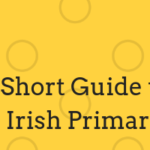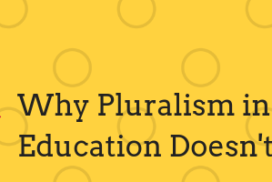Despite our country’s education system beginning with a non-denominational model, Ireland’s primary education system is almost completely controlled by church bodies, with 96% of schools having a religious body as their patronage. 90% of schools have the Catholic Church as their patron body. All of the rest but 3 have a Christian patron body.
In practice, this means that almost all schools in the country must obey the tenets of a particular religious view of the world. Given that an even higher percentage of teachers in primary schools identify as Catholic (95%) and, the likelihood that at least a certain number of the remaining 5% identify as some other Christian faith, these tenets are not an alien concept, and thus perpetuating the obvious (at least to the outsider) human rights problems that occur on a daily basis.
Add an ingredient of apathy, where many parents are quite happy for schools to take care of the religious education of their children, there is little appetite for change. As an example of the above, in 2018, Ireland overwhelmingly supported a referendum to allow abortion in Ireland. The referendum occurred right in the middle of Communion season. I was in awe of the number of people I saw on social media giving out stink about the Catholic Church and their perception of its control of women, and the very same people posting up photographs of their daughters in white dresses in a church the same day!
Schools are effectively the middlemen in the relationship between church and state. The state is supposed to provide an education for all and the church is supposed to provide their religious message to all who attend their schools. What do schools do?
Ultimately they do their best. They try to create environments where they can be as accommodating as possible to children that do not share the faith of their school. Schools will generally try and push this as far as they can. However, they must uphold their ethos, and they can never truly be 100% inclusive. Here is a guide to choosing a school in Ieland to summarise all this.

A short guide to religion in primary schools
Over the last number of years, the population of Ireland has changed. One of the things that has changed greatly in the last while is the
I’ve written quite a bit about religion in schools and here are some examples before we get to some solutions.
But surely there’s an argument that everyone should have a choice. If one doesn’t want a religious education, one can go to a non-denominational school? Perhaps if one has a different religion, there should be a school for their community? Wouldn’t the ideal situation be one where there would be a Catholic school, a Church of Ireland school, a Muslim school and then a multi-denominational school. (Bizarrely Gaelscoileanna end up in this list sometimes, but that’s for another article!)

Why Pluralism in Education Doesn’t Work
I was listening to a debate on the radio about the Angelus last week. The argument comes up every so often in the media and
One has to ask what does flavouring an education with a particular religion add to a school? More importantly, what would taking it away do? I don’t believe any school would fall apart if religion was removed from it. In fact, I think it would make life a lot easier for everyone. People that wish to practice their faith could do so in their own church communities and school buildings could be used to facilitate this is they wish, as long as it didn’t interfere with teaching time. There’s no need for buildings to be handed over to the state; they are already paying 100% of the costs for their upkeep anyway. There’s no need for complicated divestment programmes or enrollment policies.


